Fleurs du Mal Magazine


À la fois récit et manifeste, cet essai dédié à l’ardeur poétique risque à tout propos la première personne du singulier afin de témoigner de cet éblouissement que suscite la lecture d’un poème, et combien cet éblouissement peut perdurer.
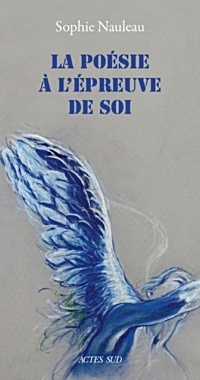 Huit brefs chapitres entraînent le lecteur sur les versants de la poésie vécue, celle qui, comme le voulait Rimbaud, change bel et bien la vie. Car il s’agit de sortir des sentiers battus où l’on veut faire croire que les poètes ne sont que des rêveurs plus ou moins solitaires. Ici l’on ose de nouveaux chemins de traverse, toutes époques et contrées confondues, jusqu’à prouver que la poésie, mise à l’épreuve de soi, a pouvoir sur les êtres et sur leur destinée.
Huit brefs chapitres entraînent le lecteur sur les versants de la poésie vécue, celle qui, comme le voulait Rimbaud, change bel et bien la vie. Car il s’agit de sortir des sentiers battus où l’on veut faire croire que les poètes ne sont que des rêveurs plus ou moins solitaires. Ici l’on ose de nouveaux chemins de traverse, toutes époques et contrées confondues, jusqu’à prouver que la poésie, mise à l’épreuve de soi, a pouvoir sur les êtres et sur leur destinée.
Ce récit, cet essai, ce manifeste, d’une tonique originalité quant à l’écriture et aux angles d’attaque, célèbre ainsi un engagement existentiel qui est la liberté même.
Présentation de l’éditeur: A la fois récit et manifeste, cet essai dédié à l’ardeur poétique risque à tout propos la première personne du singulier afin de témoigner de cet éblouissement que suscite la lecture d’un poème, et combien cet éblouissement peut perdurer. Huit brefs chapitres entraînent le lecteur sur les versants de la poésie vécue, celle qui, comme le voulait Rimbaud, change bel et bien la vie. Car il s’agit de sortir des sentiers battus où l’on veut faire croire que les poètes ne sont que des rêveurs plus ou moins solitaires. Ici l’on ose de nouveaux chemins de traverse, toutes époques et contrées confondues, jusqu’à prouver que la poésie, mise à l’épreuve de soi, a pouvoir sur les êtres et sur leur destinée.
Biographie de l’auteur: Née en 1977 à Toulouse, Sophie Nauleau est écrivain. Docteur en littérature française et diplômée de l’Ecole du Louve, elle a produit pour France Culture des documentaires et des émissions régulières. Elle a composé de nombreuses anthologies poétique, et notamment publié La Main d’oublies (Galilée), La Voie de l’écuyer (Actes Sud) et La Vie cavalière (Gallimard). Elle est désormais directrice artistique du Printemps des Poètes.
La Poésie à l’épreuve de soi
Sophie Nauleau
Éditions Actes Sud
Actes Sud Littérature
Poésie
7 Mars, 2018
Langue : Français
Poche: 80 pages
10,0 x 19,0 cm
prix indicatif : 13, 00€
ISBN-10: 2330097417
ISBN-13: 978-2330097417
new books
fleursdumal.nl magazine
More in: - Book News, - Bookstores, Archive M-N, Art & Literature News
De Uitmarkt vindt evenals vorig jaar plaats rond het Oosterdok en het Marineterrein Amsterdam. Traditiegetrouw in het laatste weekend van augustus, dit jaar van vrijdag 24 tot en met zondag 26 augustus. Gedurende deze drie dagen zijn er op zo’n 25 podia circa 300 optredens te bewonderen, met op zondagavond de populaire Musical Sing a Long als afsluiter.

De Uitmarkt vormt de start van het culturele seizoen. Het laat bezoekers proeven van het diverse culturele aanbod dat Nederland te bieden heeft. Door het succes van de afgelopen editie heeft Stichting Uitmarkt ervoor gekozen om de Uitmarkt 2018 wederom op en rond het Oosterdok te laten plaatsvinden. Met toegang tot onder andere het Scheepvaartmuseum, NEMO Science Museum en het Marineterrein Amsterdam heeft deze locatie de bezoeker veel variatie te bieden.
Meer nog dan vorig jaar, door de uitbreiding met een extra stuk terrein. Het Scheepvaartmuseum vormt opnieuw het prachtige decor van het hoofdpodium.
‘Bezoekers hebben vorig jaar enthousiast gereageerd op de nieuwe locatie. Dit in combinatie met de goede infrastructurele voorzieningen, was voor ons reden genoeg om dit gebied opnieuw in te richten voor de 41 ste editie van de Uitmarkt’, zegt Jan de Rooij, voorzitter Stichting Uitmarkt.
Bezoekers van de Uitmarkt krijgen een gratis voorproefje van wat er in het seizoen 2018-2019 in de theaters, musea en concertzalen te beleven is. Artiesten vanuit het hele land en van verschillende genres zijn aanwezig. Naast de gevestigde orde is er ook volop ruimte voor nieuwkomers. Bijvoorbeeld in de Remix Area waar urban talent uit de verschillende Amsterdamse stadsdelen zich presenteren of de jonge theatermakers op het Fringe podium.
# Meer informatie over het programma op website www.uitmarkt.nl
41ste editie van de Uitmarkt – hét startsein van het Nederlandse culturele seizoen – vindt plaats rond het Oosterdok en op het Marineterrein Amsterdam van 24 tot 26 augustus 2018.
fleursdumal.nl magazine
More in: - Book News, - Bookstores, Art & Literature News, AUDIO, CINEMA, RADIO & TV, DANCE & PERFORMANCE, Exhibition Archive, LITERARY MAGAZINES, MUSIC, STREET POETRY, THEATRE
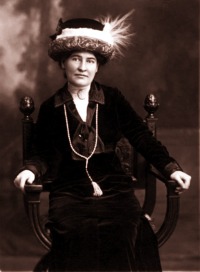
Arcadian Winter
Woe is me to tell it thee,
Winter winds in Arcady!
Scattered is thy flock and fled
From the glades where once it fed,
And the snow lies drifted white
In the bower of our delight,
Where the beech threw gracious shade
On the cheek of boy and maid:
And the bitter blasts make roar
Through the fleshless sycamore.
White enchantment holds the spring,
Where thou once wert wont to sing,
And the cold hath cut to death
Reeds melodious of thy breath.
He, the rival of thy lyre,
Nightingale with note of fire,
Sings no more; but far away,
From the windy hill-side gray,
Calls the broken note forlorn
Of an aged shepherd’s horn.
Still about the fire they tell
How it long ago befell
That a shepherd maid and lad
Met and trembled and were glad;
When the swift spring waters ran,
And the wind to boy or man
Brought the aching of his sires–
Song and love and all desires.
Ere the starry dogwoods fell
They were lovers, so they tell.
Woe is me to tell it thee,
Winter winds in Arcady!
Broken pipes and vows forgot,
Scattered flocks returning not,
Frozen brook and drifted hill,
Ashen sun and song-birds still;
Songs of summer and desire
Crooned about the winter fire;
Shepherd lads with silver hair,
Shepherd maids no longer fair.
Willa Cather
(1873-1947)
poetry
fleursdumal.nl magazine
More in: #More Poetry Archives, 4SEASONS#Winter, Archive C-D, Archive C-D
Osip Mandelstam is a central figure not only in modern Russian but in world poetry, the author of some of the most haunting and memorable poems of the twentieth century.
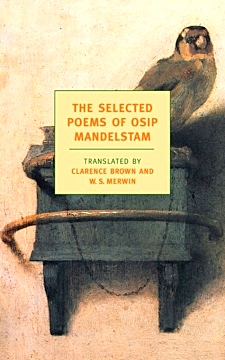 A contemporary of Anna Akhmatova, Marina Tsvetayeva, and Boris Pasternak, a touchstone for later masters such as Paul Celan and Robert Lowell, Mandelstam was a crucial instigator of the “revolution of the word” that took place in St. Petersburg, only to be crushed by the Bolshevik Revolution. Mandelstam’s last poems, written in the interval between his exile to the provinces by Stalin and his death in the Gulag, are an extraordinary testament to the endurance of art in the presence of terror.
A contemporary of Anna Akhmatova, Marina Tsvetayeva, and Boris Pasternak, a touchstone for later masters such as Paul Celan and Robert Lowell, Mandelstam was a crucial instigator of the “revolution of the word” that took place in St. Petersburg, only to be crushed by the Bolshevik Revolution. Mandelstam’s last poems, written in the interval between his exile to the provinces by Stalin and his death in the Gulag, are an extraordinary testament to the endurance of art in the presence of terror.
This book represents a collaboration between the scholar Clarence Brown and W. S. Merwin, one of contemporary America’s finest poets and translators. It also includes Mandelstam’s “Conversation on Dante,” an uncategorizable work of genius containing the poet’s deepest reflections on the nature of the poetic process.
Osip Mandelstam (1891–1938) was born and raised in St. Petersburg, where he attended the prestigious Tenishev School, before studying at the universities of St. Petersburg and Heidelberg and at the Sorbonne. Mandelstam first published his poems in Apollyon, an avant-garde magazine, in 1910, then banded together with Anna Akhmatova and Nicholas Gumilev to form the Acmeist group, which advocated an aesthetic of exact description and chiseled form, as suggested by the title of Mandelstam’s first book, Stone (1913).
During the Russian Revolution, Mandelstam left Leningrad for the Crimea and Georgia, and he settled in Moscow in 1922, where his second collection of poems, Tristia, appeared. Unpopular with the Soviet authorities, Mandelstam found it increasingly difficult to publish his poetry, though an edition of collected poems did come out in 1928. In 1934, after reading an epigram denouncing Stalin to friends, Mandelstam was arrested and sent into exile. He wrote furiously during these years, and his wife, Nadezhda, memorized his work in case his notebooks were destroyed or lost. (Nadezhda Mandelstam’s extraordinary memoirs of life with her husband, Hope Against Hope and Hope Abandoned, published in the 1970s, later helped to bring Mandelstam a worldwide audience.)
Clarence Brown is the author of a prize-winning biography of Mandelstam and is Professor Emeritus of Comparative Literature at Princeton.
W.S. Merwin was born in New York City in 1927 and grew up in Union City, New Jersey, and in Scranton, Pennsylvania. From 1949 to 1951 he worked as a tutor in France, Portugal, and Majorca. He has since lived in many parts of the world, most recently on Maui in the Hawaiian Islands. He is the author of many books of poems, prose, and translations and has received both the Pulitzer and the Bollingen Prizes for poetry, among numerous other awards.
The Selected Poems of Osip Mandelstam
by Osip Mandelstam, translated from the Russian by Clarence Brown and by W.S. Merwin
Paperback
Series: New York Review Books Classics
Pages: 192
Publ. Date: August 31, 2004
Language: English
ISBN-10: 1590170911
ISBN-13: 978-1590170915
Books That Everyone Should Read
fleursdumal.nl magazine
More in: Archive M-N, Mandelstam, Osip, REPRESSION OF WRITERS, JOURNALISTS & ARTISTS
Hij hoort stemmen. Hij kijkt om en ziet zijn dochter bij de winkel van de slager. Half in de deur, half in de winkel, staat ze te lachen. Elke dag gaat ze naar Kemp, alleen maar voor zijn praatjes en voor een onsje van dit en een stukje van dat.
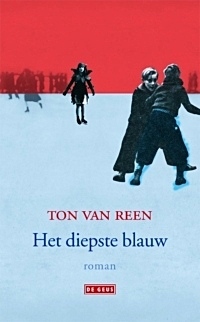 Hoe het leven gelopen is. Niet Kemp maar Mels is met Lizet getrouwd, gewoon omdat ze zwanger was na een avond vrijen. Zwanger uit balorigheid. Hij was in de val gelopen die Lizet voor hem had gezet. Ze had zijn hulp ingeroepen tegen Kemp, die haar altijd achternaliep. Na een feestavond had ze hem gevraagd om haar naar huis te brengen, om Kemp te ontmoedigen. Hij had zich laten aanhalen. De hele nacht hadden ze gevreeën, op de zolder van de watermolen, op de jutemeelzakken.
Hoe het leven gelopen is. Niet Kemp maar Mels is met Lizet getrouwd, gewoon omdat ze zwanger was na een avond vrijen. Zwanger uit balorigheid. Hij was in de val gelopen die Lizet voor hem had gezet. Ze had zijn hulp ingeroepen tegen Kemp, die haar altijd achternaliep. Na een feestavond had ze hem gevraagd om haar naar huis te brengen, om Kemp te ontmoedigen. Hij had zich laten aanhalen. De hele nacht hadden ze gevreeën, op de zolder van de watermolen, op de jutemeelzakken.
Dat zijn dochter het zo goed kan vinden met haar schoonvader Kemp ziet hij als een straf. Haar lach klinkt door de straat. Hij hoort hoe ze de weg oversteekt, terug naar huis. Haar hakken klikken op de keien. Een deur slaat dicht. Het is weer stil.
Dat uitgerekend zijn dochter trouwde met de zoon van Kemp!
Kemp zwaait naar hem. Verdomd, nu moet hij nog terugzwaaien ook.
`Jammer’, roept Kemp, zijn handen als een toeter voor de mond. `Ik kan de winkel niet sluiten voor een lezing. Ik weet trouwens net zo veel over vroeger als jij.’
Mels reageert niet. Kemp liegt. Hij is nooit zijn winkel uit geweest. De mannen van het dorp werkten in de fabriek. Allemaal. Kemp weet niet hoe het er in de fabriek aan toeging. Hij kan nooit zoveel weten als Mels, die de administratie van de fabriek heeft gedaan en de salarissen heeft betaald. Hij weet wat de vrouwen uit te geven hadden. Thuis heeft hij de hele boekhouding, waarin hij zelfs het leven na kan gaan van de eerste generatie arbeiders in de watermolen. Hij kan zich met recht de chroniqueur van het dorp noemen. Wat weet zo’n Kemp meer dan wat gepraat over de kwaliteit van het vlees? Waarover praten ze in een slagerswinkel? Vertellen die vrouwen aan Kemp alles? Over hun haar dat anders moet? Over hun kerel die hen slaat? Leggen ze hun hele ziel en zaligheid bij Kemp op het hakblok?
Misschien heeft Kemp ook een beetje gelijk. De vrouwen hebben een andere geschiedenis. De meesten werkten nooit langer dan een paar jaar in de fabriek, tot ze trouwden of zwanger werden. Kemp kent de vrouwen beter, ook al kent hij ze alleen maar uit zijn winkel. De geschiedenis van de vrouwen is een heel andere dorpsgeschiedenis. Als zij er een boek over zouden schrijven, zou de geschiedenis van de fabriek maar van ondergeschikt belang zijn.
Hij rijdt naar het café. De deur gaat open. Koen, de kastelein, gaapt naar buiten en raapt de krant van de deurmat.
`Koffie?’ roept hij naar Mels.
Binnen hangt de zoetige lucht van verschaald bier en van verse koffie. Koen heeft pas een moderne espressomachine gekocht. Koffie uit Italië. Het hele café ruikt naar Rome. Koffie zoals hij die vroeger op vakantie in Italië dronk, als hij daar kampeerde. Als Lizet en de kleine nog sliepen. Zes, zeven uur in de ochtend, zo vroeg al liep hij van de camping naar het dorp. Zalig, dat gevoel van lopen. Het knisperen van het grind onder zijn schoenen. Benen die synchroon bewogen. Sterke benen. Voeten die konden kijken en feilloos de bulten en stenen vermeden. In Italië heeft hij de vreugde van het lopen geleerd. Lopen als zintuig. In het dorpscafé hadden ze daar toen al een espressoapparaat. Zo vroeg was daar al volk. Oudere mannen die witte wijn dronken, om zeven uur in de ochtend. Jonge mannen die vier, vijf kopjes espresso achter elkaar dronken om klaarheid in hun ogen te krijgen.
Hijzelf werd dromerig van de espresso. Ochtendcognac noemde hij het. En er was muziek. Plaatjes die alleen ‘s ochtends vroeg in koffiezaken werden gedraaid. Rita Ketty, met haar stem vol heimwee. En er werden kranten gelezen, waar de inkt nog van plakte. Foto’s van vermoorde hoeren in achtertuintjes van nette mensen. Ongelukken op de autostrada. Een Fiat 600 op de kop achter de vangrail met daarnaast dode kinderen in het gras. Bloed in zwart-wit. En dáárnaast een foto van een Mariaverschijning in Palermo, in scène gezet, want Maria toonde zich alleen aan de zieneres, een oude dame met dweperige ogen die heiligheid afsmeekten. En ook de stigmata van pater Pio waren weer gaan bloeden. De wonden van Christus, de nagels in handen en voeten, de doorns van de doornenkroon. Italië was altijd heftig. Pagina één droop altijd van het bloed.
Zwevend op espressogeuren en een veel te vroeg gedronken witte wijn, ging hij terug naar de tent en bereidde het ontbijt. Ingetogen, wakker maar dromend. Vergevingsgezind. Zolang ze sliepen, hoorden ze bij hem. Zolang ze stil waren, hield hij van hun aanwezigheid. De ochtend was intiem, totdat ze wakker werden en alles weer gewoon was. Gewoon een gezin dat zich aan de regels van de dag hield. Geen tijd voor dromen. Mels, doe dit. Mels, doe dat. Zet de haringen vast, het gaat waaien. Het gas is op, net nu de aardappels bijna gaar zijn, haal vlug een nieuwe fles. Nee, geen kant-en-klare pizza’s. Denk je dat ik al die aardappels weggooi! Nog voor het avond was, verlangde hij al naar de volgende ochtend. Om te lopen.
Italië, daar kan hij nooit meer heen. Frankrijk ook niet. De fietstocht die hij naar Santiago de Compostela had willen maken, is hem afgenomen. En de reis naar China. Terwijl tegenwoordig iedereen naar China gaat. China is een gewoon vakantieland geworden. De toeristen fotograferen elkaar bij de Chinese Muur. Wat zou hij die duizenden kilometers graag gelopen hebben. Met Thija en Tijger. Aan elke steen van de Muur zit een verhaal. Dat moet je met handen en voeten voelen.
De kastelein zet hem koffie voor en poetst de koffiemachine blinkend op.
Mels nipt aan de drank en geniet.
`Het was druk bij de meelfabriek vannacht’, zegt Koen. `Ze maken er een attractie van.’
`Wat een onzin.’
`Ik heb er geen problemen mee. Goed voor de zaak als hier volk komt. Daarom heb ik de koffiemachine gekocht. Dagjesmensen willen échte koffie.’ Hij haalt de lap nog eens over de blinkende machine. `Ik ga ook souvenirs verkopen. Toeristen nemen van alles mee. Ansichtkaarten. Foto’s van de silo.’
`Die heb ik genoeg. Je hoeft maar te kiezen. Ik heb alle fotomappen bij me.’ Mels legt de tas met foto’s op de bar. `Wat denk je, komen er straks veel mensen?’
`Iedereen weet het’, zegt Koen, door een map bladerend. `Het heeft in het dorpsblad gestaan. De projector staat al klaar. Ik heb twintig stoelen klaargezet.’
`Dat zijn er te weinig.’
`Ik heb er nog achter de hand.’
`Je moet ook foto’s van de Wijer verkopen.’
`Van zo’n beek? We moeten foto’s van het dorp van vroeger hebben.’ Koen slaat het album dicht. `Die zitten hier niet in. Mensen in klederdracht, daar zijn toeristen gek op.’
`Wij liepen hier niet in klederdracht.’
`Een silo en een watermolen zijn te weinig voor toeristen. Aan de Wijer ligt nog ergens een bunker. Daar kunnen we ze naartoe sturen. En dan vertel jij ze over de oorlog. Je kunt de mensen wijsmaken wat je wilt.’
`Hier is nauwelijks iets gebeurd wat het herinneren waard is. Alleen John Wilkington.’
`Wie?’
`De Engelse piloot die tegen de silo is gevlogen. Hij heeft een paar weken bij ons op zolder gewoond. De oorlog ging langs ons heen. De meeste mensen kwamen er pas achter dat er oorlog was toen we werden bevrijd. Ze hadden wel eens Duitse soldaten gezien, maar die hebben hier alles gelaten zoals het was. De meelfabriek is altijd blijven draaien. Ook Duitsers hadden brood nodig.’
`Dat die Wilkington tegen de silo vloog en bij jullie op zolder zat, daar zit wel een verkoopbaar verhaal in’, zegt Koen. `Schrijf het eens op voor het dorpsblad.’
Ton van Reen: Het diepste blauw (066)
wordt vervolgd
fleursdumal.nl magazine
More in: - Book Stories, - Het diepste blauw, Archive Q-R, Reen, Ton van
Original, touching and much-anticipated first collection from star of the Faber New Poets scheme.
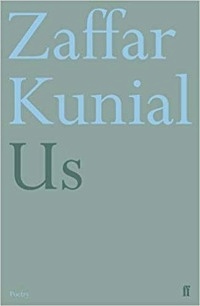
Zaffar Kunial was born in Birmingham and lives in Hebden Bridge.
He published a pamphlet in the Faber New Poets series in 2014 and spent that year as the Wordsworth Trust Poet-in-Residence.
Since his first public reading, of ‘Hill Speak’ at the 2011 National Poetry Competition awards, he has spoken at various literature festivals and in programmes for BBC radio, and won the Geoffrey Dearmer Prize for his poem ‘The Word’.
Us (Faber New Poets)
by Zaffar Kunial (Author)
Paperback
5 Jul 2018
Paperback: 64 pages
Publisher: Faber & Faber
Language: English
ISBN-10: 0571337651
ISBN-13: 978-0571337651
Dimensions: 195 x 135 x 10 mm
Publisher: Faber & Faber
new books
fleursdumal.nl magazine
More in: - Book News, Archive K-L, Archive K-L, Art & Literature News

A Death-scene
“O day! he cannot die
When thou so fair art shining!
O Sun, in such a glorious sky,
So tranquilly declining;
He cannot leave thee now,
While fresh west winds are blowing,
And all around his youthful brow
Thy cheerful light is glowing!
Edward, awake, awake–
The golden evening gleams
Warm and bright on Arden’s lake–
Arouse thee from thy dreams!
Beside thee, on my knee,
My dearest friend, I pray
That thou, to cross the eternal sea,
Wouldst yet one hour delay:
I hear its billows roar–
I see them foaming high;
But no glimpse of a further shore
Has blest my straining eye.
Believe not what they urge
Of Eden isles beyond;
Turn back, from that tempestuous surge,
To thy own native land.
It is not death, but pain
That struggles in thy breast–
Nay, rally, Edward, rouse again;
I cannot let thee rest!”
One long look, that sore reproved me
For the woe I could not bear–
One mute look of suffering moved me
To repent my useless prayer:
And, with sudden check, the heaving
Of distraction passed away;
Not a sign of further grieving
Stirred my soul that awful day.
Paled, at length, the sweet sun setting;
Sunk to peace the twilight breeze:
Summer dews fell softly, wetting
Glen, and glade, and silent trees.
Then his eyes began to weary,
Weighed beneath a mortal sleep;
And their orbs grew strangely dreary,
Clouded, even as they would weep.
But they wept not, but they changed not,
Never moved, and never closed;
Troubled still, and still they ranged not–
Wandered not, nor yet reposed!
So I knew that he was dying–
Stooped, and raised his languid head;
Felt no breath, and heard no sighing,
So I knew that he was dead.
Emily Brontë
(1818-1848)
poetry
fleursdumal.nl magazine
More in: Archive A-B, Brontë, Anne, Emily & Charlotte, In Memoriam
Godard and the Essay Film offers a history and analysis of the essay film, one of the most significant forms of intellectual filmmaking since the end of World War II. Warner incisively reconsiders the defining traits and legacies of this still-evolving genre through a groundbreaking examination of the vast and formidable oeuvre of Jean-Luc Godard.
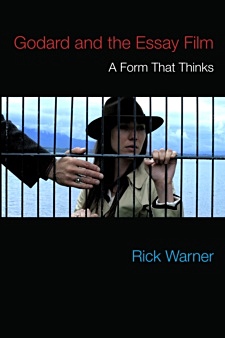 The essay film has often been understood by scholars as an eccentric development within documentary, but Warner shows how an essayistic process of thinking can materialize just as potently within narrative fiction films, through self-critical investigations into the aesthetic, political, and philosophical resources of the medium.
The essay film has often been understood by scholars as an eccentric development within documentary, but Warner shows how an essayistic process of thinking can materialize just as potently within narrative fiction films, through self-critical investigations into the aesthetic, political, and philosophical resources of the medium.
Studying examples by Godard and other directors, such as Orson Welles, Chris Marker, Agnès Varda, and Harun Farocki, Warner elaborates a fresh account of essayistic reflection that turns on the imaginative, constructive role of the viewer.
Through fine-grained analyses, this book contributes the most nuanced description yet of the relational interface between viewer and screen in the context of the essay film. Shedding new light on Godard’s work, from the 1960s to the 2010s, in film, television, video, and digital stereoscopy, Warner distills an understanding of essayistic cinema as a shared exercise of critical rumination and perceptual discovery.
Rick Warner is an assistant professor of film in the Department of English and Comparative Literature at the University of North Carolina, Chapel Hill.
Godard and the Essay Film
A Form That Thinks
Rick Warner
Publication Date: July 2018
Categories: Film
Page Count: 288 pages
Size 6 x 9
Northwestern University Press
Cloth Text – $99.95
ISBN 978-0-8101-3738-7
Paper Text – $34.95
ISBN 978-0-8101-3737-0
new books
fleursdumal.nl magazine
More in: - Book News, - Bookstores, Archive G-H, Art & Literature News, AUDIO, CINEMA, RADIO & TV, Photography
A fascinating glimpse into design behind the Iron Curtain, revealed through the products and graphics of everyday Soviet life
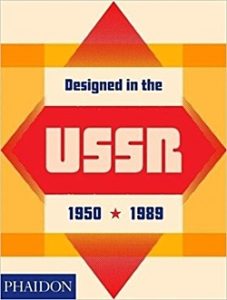 This captivating survey of Soviet design from 1950 to 1989 features more than 350 items from the Moscow Design Museum’s unique collection.
This captivating survey of Soviet design from 1950 to 1989 features more than 350 items from the Moscow Design Museum’s unique collection.
From children’s toys, homewares, and fashion to posters, electronics, and space-race ephemera, each object reveals something of life in a planned economy during a fascinating time in Russia’s history.
Organized into three chapters – Citizen, State, and World – the book is a micro-to-macro tour of the functional, kitsch, politicized, and often avant-garde designs from this largely undocumented period.
Designed in the USSR: 1950-1989
Moscow Design Museum
Publisher: Phaidon Press
April 2018
Editions: Hardback
Language: English
Price: €34.95
Format: Hardback
Size: 270 x 205 mm
Pages: 240 pp
Illustrations: 350 illustrations
ISBN-10: 0714875570
ISBN-13: 978-0714875576
new books
fleursdumal.nl magazine
More in: - Book News, - Bookstores, Art & Literature News, Design, Illustrators, Illustration, Photography
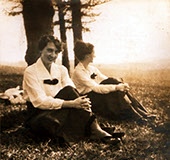
Grief
Exultant whirlwind wrung the branches ;
And the weak leaves were loosed with power.
I heard the pelting dissonances ;
Anguish in the autumn shower.
But living petals now take wing
Like butterflies with dusky flashes;
April flutters her white ashes
Inaudibly, remembering.
Gladys Cromwell
(1885-1919)
Grief
fleursdumal.nl magazine
More in: Archive C-D, Cromwell, Gladys, Gladys Cromwell

Poe’s cottage at Fordham
Here lived the soul enchanted
By melody of song;
Here dwelt the spirit haunted
By a demoniac throng;
Here sang the lips elated;
Here grief and death were sated;
Here loved and here unmated
Was he, so frail, so strong.
Here wintry winds and cheerless
The dying firelight blew,
While he whose song was peerless
Dreamed the drear midnight through,
And from dull embers chilling
Crept shadows darkly filling
The silent place, and thrilling
His fancy as they grew.
Here with brows bared to heaven,
In starry night he stood,
With the lost star of seven
Feeling sad brotherhood.
Here in the sobbing showers
Of dark autumnal hours
He heard suspected powers
Shriek through the stormy wood.
From visions of Apollo
And of Astarte’s bliss,
He gazed into the hollow
And hopeless vale of Dis,
And though earth were surrounded
By heaven, it still was mounded
With graves. His soul had sounded
The dolorous abyss.
Poor, mad, but not defiant,
He touched at heaven and hell.
Fate found a rare soul pliant
And wrung her changes well.
Alternately his lyre,
Stranded with strings of fire,
Led earth’s most happy choir,
Or flashed with Israfel.
No singer of old story
Luting accustomed lays,
No harper for new glory,
No mendicant for praise,
He struck high chords and splendid,
Wherein were finely blended
Tones that unfinished ended
With his unfinished days.
Here through this lonely portal,
Made sacred by his name,
Unheralded immortal
The mortal went and came.
And fate that then denied him,
And envy that decried him,
And malice that belied him,
Here cenotaphed his fame.
John Henry Boner
(1845-1903)
poetry
fleursdumal.nl magazine
More in: Archive A-B, Edgar Allan Poe, Poe, Edgar Allan
Ellen Hinsey’s new book-length sequence, The Illegal Age, is a powerful investigation into the twentieth-century’s dark legacy of totalitarianism and the rise of political illegality.
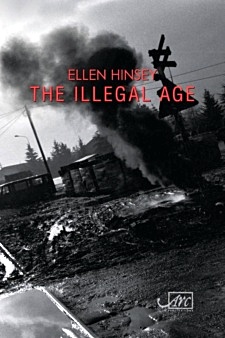 It explores the enduring potential for human beings to set neighbour against neighbour and commit final acts of violence. A book of lyrical reflection and prophesy, The Illegal Age chronicles the arrival of a new, disquieting reality unfolding in our midst.
It explores the enduring potential for human beings to set neighbour against neighbour and commit final acts of violence. A book of lyrical reflection and prophesy, The Illegal Age chronicles the arrival of a new, disquieting reality unfolding in our midst.
As Marilyn Hacker has written, “In dialogue with Celan, Szymborska, Milosz… this is a daring text – for its political acuity, and for its demonstration of the power in poetry to recount, remember, move the heart while opening the mind.”
Written in parallel with her first-hand research into the rise of authoritarianism carried out over the last decade, Hinsey’s volume warns that – rather than an “Age of Anxiety” – we may indeed be facing the start of the “Illegal Age”.
Ellen Hinsey was born in 1960 in Boston, Massachusetts. For the last two decades she has lived in Europe. She received a Bachelor of Fine Arts degree from Tufts University and a graduate degree from Université de Paris VII. She has taught at the French graduate school the Ecole Polytechnique and currently teaches at Skidmore College s Paris program. She is the international correspondent for The New England Review.
Hinsey’s work is concerned with history, ethics and democracy. Her first-hand accounts and analyses of the impact of the 2012 Russian presidential elections, the 2010 Polish presidential plane crash, Hungarian politics, Václav Havel’s ethical legacy and post-1989 German reconstruction have been published in The New England Review. A selection of these essays are included in her book <ik>Mastering the Past: Contemporary Central and Eastern Europe and the Rise of Illiberalism (Telos Press, 2017). Her current work addresses global authoritarianism.
Hinsey’s first book, Cities of Memory, draws on her experiences at the Berlin Wall on the weekend of November 9, 1989, as well as in Prague during the Velvet Revolution. The book received the Yale Series Award and was published by Yale University Press in 1996. Her second book, The White Fire of Time (Wesleyan University Press, 2002 / Bloodaxe Books, 2003), written after a family tragedy, is an exploration of ethics and renewal.
Later, you will realize that compromise is the wood that burns
Most brightly in the hour before regret.
But by then, all the doors will have been marked in yellow chalk.
Still, let us not pass each other this final time, without recognition,
Without looking each other in the eye.
Remember: in the ink-light of testimony, a record may still be kept.
Ellen Hinsey (fragment)
The Illegal Age
by Ellen Hinsey (Author)
PBS Autumn Choice 2018
Publisher: Arc Publicationas
July 2018
120 pages
Language: English
ISBN-10: 191146938X
ISBN-13: 978-1911469384
Product Dimensions: 15 x 2.2 x 21 cm
Hardcover £13.99
Paperback £10.99
new books
fleursdumal.nl magazine
More in: - Book News, Archive G-H, Art & Literature News, EDITOR'S CHOICE
Thank you for reading Fleurs du Mal - magazine for art & literature